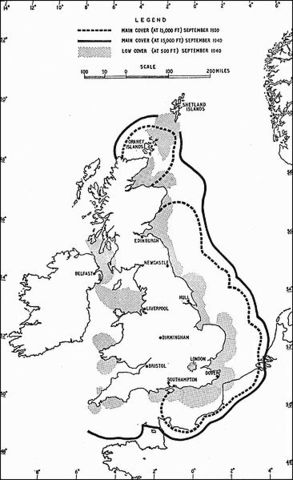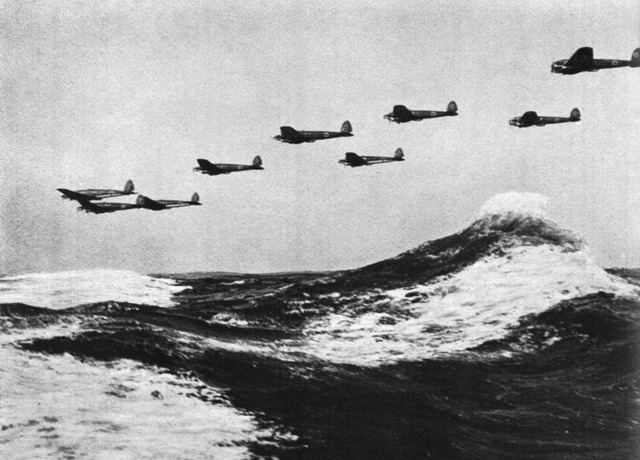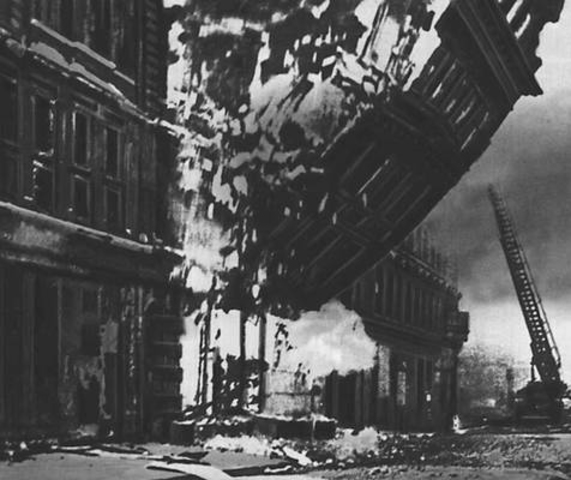8. Battle of Britain
"My Luftwaffe is invincible... And so now we turn to England. How long will this one last - two, three weeks?"
- Hermann GoringGermany successes in Mainland Europe made two impacts, first, the fear of Paratroopers, and second, overestimating the German war machine.
The British public fear that paratroopers could easily knock out British defences, cut off supply lines easily, or even capture a town by themselves. It have been proved that paratroopers role were exaggerated. The paratroopers attack by Allied forces the night before D-Day show that paratroopers need immediate ground forces reinforcement, before running out of supplies. Something that the Germans could not do in 1940.
Also as the German feat, knocking France as the most powerful army in Europe in 1940 just in 6 weeks were incredible, the British public overestimated the German Army. Even the British Intelligence believed that RAF could not fight with Luftwaffe, and they believed the Kriegsmarine were still fully operational after Weserubung. OKM, knowing their fleet conditions, were skeptic about the Seelowe plans.
This all made the British morale were low, in the first part of Battle of Britain.
The inability of Kriegsmarine to successfully implement Seelowe made Hitler want to suspend the Unternehmen Seelowe until May 1941, 10 months later. But later it were determined by the successes of Luftwaffe. If the Luftwaffe could break the RAF and RN, then the Seelowe will be commenced in September 1940. Goering believed that he could wipe the Royal Navy with his airforce, that could block the German landings. He also believed that he could break the RAF, in an air campaign that was famous as "Battle of Britain".
Battle of Britain were the first campaign to be fought entirely with airplanes, Battle of Britain was fought in 10 July – 31 October 1940.
For the attack, named Adlerangriffe, or Eagle Attack, Luftwaffe prepared 3 Luftflotten, that consist of 963 fighters and 1311 bombers. On the other side, British could only prepare, at most, 800 fighters.
The German fighters consist of Bf 109 E and Bf 110 fighters, with He 111 and Ju 88 as its bombers. The fighters were mostly equal with its counterpart, the Hurricane Mk I and Spitfire Mk I.
The first part of Battle of Britain were the battles over the Channel. Luftwaffe mainly were used to harass enemy convoys and ships in British harbour. This is a trap to lure the RAF to be obliterated by the Luftwaffe. This trap mainly failed, as Hugh Dowding, the Commander-in-Chief, Air Chief Marshal of the RAF saw this trap. The British prefer their ships to be destroyed rather than their airforce. While this trap failed, RAF still sends limited amount of aircraft to engage Luftwaffe, mainly because of the terrain, that favored the Germans. It gave German pilots some experience. The RAF suffered high casualties, while the Luftwaffe did not suffered much.
The Adlertag, or the main attack commenced in 13 August 1940. Luftwaffe targeted the British forward airfields. And as the week drew on, the airfield attacks moved further inland, and repeated raids were made on the radar chain. The Luftwaffe believed that RAF was concentrated in the South, and a raiding force was launched from Norway and Denmark. They encountered strong resistance, and suffered high casualties.
In 18 August, casualties peaked in each side, and made the Luftwaffe to review their performance. The Ju 87 Stuka was believed to very vulnerable from British fighters, and were phased out.
Later Goering stopped the Radar Chain attack, these were seen as unsuccessful and a waste of resources. Luftwaffe did not see the Chain Home Radar as effective.
 Chain Home Radar coverage
Chain Home Radar coverageGoering later changed the Luftwaffe targets to RAF airfields and Aircraft Factories. Raids were commenced in 23 August 1940. In 24 August 1940, a group of He 111 accidentally bombed Central London which had failed to find their target. In 25-26 August, RAF mounted raids to Berlin as retaliation. Hitler was enraged, and ordered Goering to bomb London. This order proved to be a saving grace to the RAF, as the RAF was battered when the offensive began. RAF lost its 1/4 of its pilots, and they could not replace these losses quickly. Also RAF suffered high aircraft losses in this time. And when London was bombed in the 7th September, the Fighter Command reorganized and replace its losses.
 German Heinkel 111 flying past the English Channel.
German Heinkel 111 flying past the English Channel.From 7 to 14 September, Luftwaffe attack British cities in daylight and nighttime bombing. Its bomber force were strained, and suffered high losses compared to the British losses in daylight bombing. Luftwaffe later switched to Nighttime bombing in 15 September. The sustained bomber attacks were hoped to break the British morale, as it is believed that it is more effective than direct invasion. While the materiel and life losses were great, the British morale was still high, the important factor to that were the King and Queen, who chose to stay in London. This attack, named The Blitz by the British, continued until 21 May 1941.
 Bombing of London.
Bombing of London.
Hitler postponed the invasion on 13 October "until the spring of 1941", and October is regarded as the month regular bombing of Britain ended. It was not until Hitler's Directive 21 was issued, on 18 December 1940, that the threat of invasion finally ended.
The Chain Home Radar significantly contributed to the British victory, as it made the RAF to pre-emptively prepares its crew and aircraft before the Germans came. Also fighting in home front contributes, as British downed pilots could easily be rescued and got back to his airbase in minutes, while German downed crew will be held prisoners.
The Battle of Britain was the first major defeat for the Axis. This battle was shown as vital for the British, as it stopped the planned German invasion of Great Britain. The British victory in the Battle of Britain was achieved at a heavy cost. Total British civilian losses from July to December 1940 were 23,002 dead and 32,138 wounded, with one of the largest single raids on 19 December 1940, in which almost 3,000 civilians died.
While Battle of Britain was an attempt to break the RAF and force Britain to accept the negotiated peace settlement with Strategic Bombing, another attempt were tried. The German attempt on cutting the vital British supply lines in the sea, and British attempt to defend its vulnerable supply lines, famously called "Battle of Atlantic", will be discussed in the next episode.